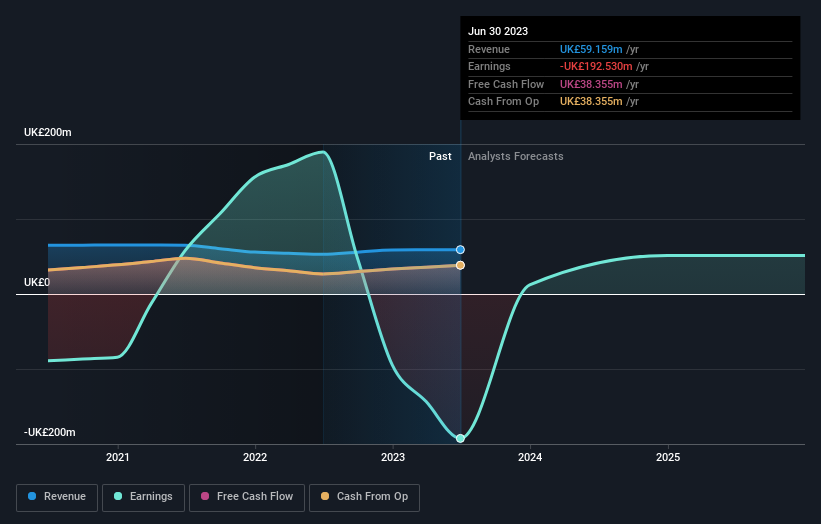Balanced Commercial Property Trust Ltd's (LON:BCPT) top owners are retail investors with 50% stake, while 50% is held by institutions
Key Insights
Significant control over Balanced Commercial Property Trust by retail investors implies that the general public has more power to influence management and governance-related decisions
The top 25 shareholders own 49% of the company
Institutional ownership in Balanced Commercial Property Trust is 50%
To get a sense of who is truly in control of Balanced Commercial Property Trust Ltd (LON:BCPT), it is important to understand the ownership structure of the business. With 50% stake, retail investors possess the maximum shares in the company. That is, the group stands to benefit the most if the stock rises (or lose the most if there is a downturn).
Institutions, on the other hand, account for 50% of the company's stockholders. Large companies usually have institutions as shareholders, and we usually see insiders owning shares in smaller companies.
Let's take a closer look to see what the different types of shareholders can tell us about Balanced Commercial Property Trust.
View our latest analysis for Balanced Commercial Property Trust
What Does The Institutional Ownership Tell Us About Balanced Commercial Property Trust?
Many institutions measure their performance against an index that approximates the local market. So they usually pay more attention to companies that are included in major indices.
As you can see, institutional investors have a fair amount of stake in Balanced Commercial Property Trust. This can indicate that the company has a certain degree of credibility in the investment community. However, it is best to be wary of relying on the supposed validation that comes with institutional investors. They too, get it wrong sometimes. When multiple institutions own a stock, there's always a risk that they are in a 'crowded trade'. When such a trade goes wrong, multiple parties may compete to sell stock fast. This risk is higher in a company without a history of growth. You can see Balanced Commercial Property Trust's historic earnings and revenue below, but keep in mind there's always more to the story.
Hedge funds don't have many shares in Balanced Commercial Property Trust. Aviva Investors Global Services Ltd. is currently the company's largest shareholder with 23% of shares outstanding. With 5.8% and 5.5% of the shares outstanding respectively, BlackRock, Inc. and Investec Wealth & Investment Limited are the second and third largest shareholders.
A deeper look at our ownership data shows that the top 25 shareholders collectively hold less than half of the register, suggesting a large group of small holders where no single shareholder has a majority.
While studying institutional ownership for a company can add value to your research, it is also a good practice to research analyst recommendations to get a deeper understand of a stock's expected performance. There is a little analyst coverage of the stock, but not much. So there is room for it to gain more coverage.
Insider Ownership Of Balanced Commercial Property Trust
The definition of an insider can differ slightly between different countries, but members of the board of directors always count. The company management answer to the board and the latter should represent the interests of shareholders. Notably, sometimes top-level managers are on the board themselves.
I generally consider insider ownership to be a good thing. However, on some occasions it makes it more difficult for other shareholders to hold the board accountable for decisions.
Our data suggests that insiders own under 1% of Balanced Commercial Property Trust Ltd in their own names. It has a market capitalization of just UK£483m, and the board has only UK£230k worth of shares in their own names. Many investors in smaller companies prefer to see the board more heavily invested. You can click here to see if those insiders have been buying or selling.
General Public Ownership
The general public, mostly comprising of individual investors, collectively holds 50% of Balanced Commercial Property Trust shares. This size of ownership gives investors from the general public some collective power. They can and probably do influence decisions on executive compensation, dividend policies and proposed business acquisitions.
Next Steps:
It's always worth thinking about the different groups who own shares in a company. But to understand Balanced Commercial Property Trust better, we need to consider many other factors. Be aware that Balanced Commercial Property Trust is showing 1 warning sign in our investment analysis , you should know about...
But ultimately it is the future, not the past, that will determine how well the owners of this business will do. Therefore we think it advisable to take a look at this free report showing whether analysts are predicting a brighter future.
NB: Figures in this article are calculated using data from the last twelve months, which refer to the 12-month period ending on the last date of the month the financial statement is dated. This may not be consistent with full year annual report figures.
Have feedback on this article? Concerned about the content? Get in touch with us directly. Alternatively, email editorial-team (at) simplywallst.com.
This article by Simply Wall St is general in nature. We provide commentary based on historical data and analyst forecasts only using an unbiased methodology and our articles are not intended to be financial advice. It does not constitute a recommendation to buy or sell any stock, and does not take account of your objectives, or your financial situation. We aim to bring you long-term focused analysis driven by fundamental data. Note that our analysis may not factor in the latest price-sensitive company announcements or qualitative material. Simply Wall St has no position in any stocks mentioned.


